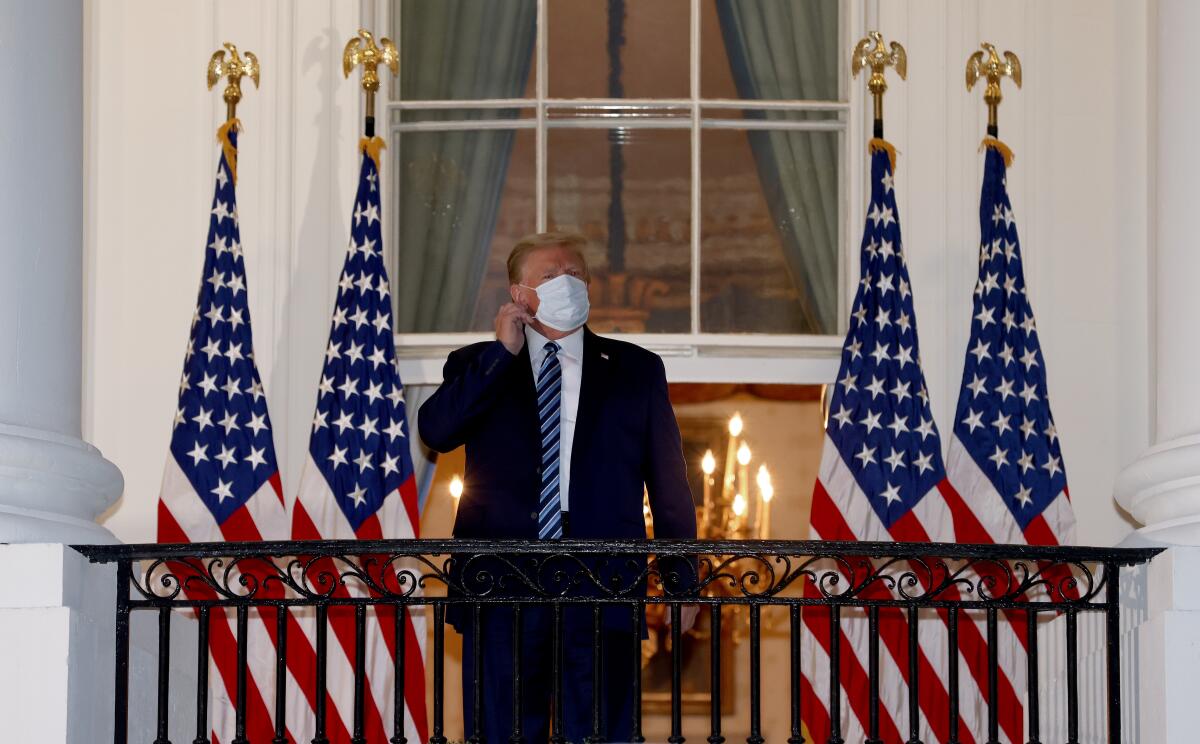Opinion: COVID changed Trump for the worse

- Share via
Good morning. I’m Paul Thornton, and it is Saturday, Oct. 10, 2020. Good news, fellow mountain wanderers: The Angeles National Forest has reopened, except for the roughly 115,000 acres that have burned in the Bobcat fire. Speaking of uncontrollable disasters, let’s take a look back at the week in Opinion.
Well, that didn’t go well. The subject line for last week’s newsletter was “Let’s hope having COVID-19 changes Trump,” but it might have helped if I specified how the president’s illness should change him: Abandon the belligerence, don’t dial it up. Embrace your inner empath, don’t ignore him. Admit that the doctors and scientists are right about COVID-19, don’t confuse your sickness for expertise. Well-adjusted humans who endure hardship don’t have to be told any of this, but here we are.
And where is that? Stuck with an unglued president whose perilous mental state has been laid bare in rambling interviews with (who else?) Sean Hannity and Rush Limbaugh, and without a way for anyone but Trump’s most loyal Cabinet members to temporarily dislodge powers from him, says columnist Robin Abcarian. She writes approvingly of House Speaker Nancy Pelosi’s legislation to set up a body that would address a president’s dangerous instability, but only after Trump leaves office.
Understandably, Trump’s illness took up a lot of ink on our opinion pages this week, and let’s hope for his health the same doesn’t happen next week. On the point of wishing for the president’s swift recovery, Erin B. Logan deals with the tricky moral issue of feeling empathy for a man who has none. The Times editorial board worries that the president’s doctors, seemingly “influenced by Trump’s desperate need to be seen as uncommonly hale and hearty,” are failing to keep the American people adequately informed of their patient’s condition. The nation’s COVID-19 condition, meanwhile, is deteriorating, as it has been since the president assured us in February that everything would be fine.
Something oddly normal happened this week: We watched a debate filled with complete sentences. The exchange between Vice President Mike Pence and Sen. Kamala Harris was refreshingly more boring than Trump’s televised tantrum the previous week, but it wasn’t without its moments. Virginia Heffernan marvels at the prosecutorial way Harris allowed Pence essentially to argue against himself. The editorial board lauded the candidates for being civil, if not exactly elucidating. Readers gave bad reviews to the vice president, especially for his inability to follow the rules.
Here’s something we should be worried about: An anti-government group in Michigan was accused of planning to kidnap Gov. Gretchen Whitmer and seize control of the same statehouse that was overrun last April by armed demonstrators who were egged on by the president’s tweet, “LIBERATE MICHIGAN” (caps his). Thankfully, federal agents foiled this plot, but as Scott Martelle points out, this handful of armed aggressors is not alone, especially in Michigan. L.A. Times
What’s going on between Armenia and Azerbaijan? There’s a decades-long history of mutual aggression between the neighboring onetime Soviet states, but what feels frighteningly dangerous about the latest round of hostilities is Turkey’s backing of Azerbaijan’s forces, writes Armenian Ambassador to the U.S. Varuzhan Nersesyan. The ambassador warns that Azerbaijan and Turkey may be acting now to take advantage of the world’s distraction by a global pandemic, and he asks for the U.S. to intervene before this becomes a major regional conflict. L.A. Times
Enjoying this newsletter? Consider subscribing to the Los Angeles Times
Your support helps us deliver the news that matters most. Become a subscriber.
Californians can show their commitment to anti-racism by passing Proposition 16, writes columnist Nicholas Goldberg. In 1996, voters passed Proposition 209, which banned affirmative action and set back for a generation efforts to diversify top schools in the UC system. Proposition 16 would reverse 209, a move that Goldberg says California needs to make: “We may live in a society in which lynchings and poll taxes and whites-only water fountains are passé. But even if more overt forms of racism have receded from view, enormous obstacles to success — obstacles embedded in the very structure of our society and institutions — still stand in the way of many Californians of color.” L.A. Times
Hooray, the CDC finally admitted the coronavirus is airborne. Remember way back in April, when no one wore masks and everyone thought the virus that causes COVID-19 travels on respiratory drops that fall to the ground after only a few feet? We bathed our groceries like they were babies and thought maskless social distancing would save us, but we were wrong — and so was the CDC, says Karin Klein. Finally, that changed this week, but it’s sobering to think how many lives might have been saved if we had started wearing masks at the start of the pandemic. L.A. Times
Stay in touch.
If you’ve made it this far, you’re the kind of reader who’d benefit from subscribing to our other newsletters and to the Times.
As always, you can share your feedback by emailing me at [email protected].
A cure for the common opinion
Get thought-provoking perspectives with our weekly newsletter.
You may occasionally receive promotional content from the Los Angeles Times.




